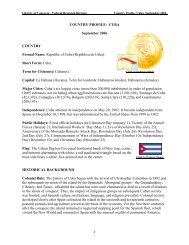1 - American Memory
1 - American Memory
1 - American Memory
You also want an ePaper? Increase the reach of your titles
YUMPU automatically turns print PDFs into web optimized ePapers that Google loves.
H.R. 7189 may be criticized, as was S. 1566, for allowinpr an em-<br />
ployer or a labor organization to apply for an injunction continuing<br />
the normal flow of commerce with the Pacific Islands, thus creating a<br />
"private weapon" for the parties to the dispute.<br />
I would recommend that this subcommittee adopt an amendment<br />
deleting this authority, as did the Senate on motion of the sponsors<br />
of S. 1566 during floor debate. Such amendment would allow only the<br />
(rovernors of Hawaii. Guam, or <strong>American</strong> Samoa, or the High Com-<br />
missioner of the Trust Territory of the Pacific Islands, to seek an<br />
iniunction applying the act.<br />
Objection has also been made that the broad sweep of the bill's<br />
language would permit the act to be invoked if a single ship is delayed<br />
by as much as 48 hours, which is contrasted unfavorably with the<br />
"national emergency" requirement of Taft-Hartley and the "essential"<br />
transportation services standard found in the Railway I>abor Act.<br />
It is my Ijelief that the Governor or chief executive of Hawaii or of<br />
the other U.S. Pacific Islands would make a responsible distinction<br />
between a minor tieup and a maior shutdown of ocean commerce suffi-<br />
cient to imperil the people and economy of his State or territory.<br />
However, the subcommittee may wish to consider an amendment<br />
raisine the threshold.<br />
Gritics also suggest that it could be very disniptive to enact Federal<br />
legislation which could affect the interests and bargaining positions of<br />
both labor and management.<br />
A recent study indicated that the exemption for Hawaii provided<br />
by S. 1566 would iuAolve only .31/^ percent of the man-hours normally<br />
worked by west coast longshoremen and only 7.3 percent of the total<br />
man-days worked by shipboard labor with west coast contracts. It is<br />
clear that this would have only a negligible effect on collective bargain-<br />
ing negotiations and on the ability of labor and management to apply<br />
pressure on each other. Indeed, providing an exemption for the Pacific<br />
Islands would probably reduce the likelihood of miich more massive<br />
Federal intervention under Taft-Hartley.<br />
During the 1971-72 west coast longshore strike, the dockworkers<br />
union and the emplojers' bargaining group voluntarily agreed to<br />
move—and did move—military cargo approximately equal to the com-<br />
bination of the military and the Pacific Islands cargo which would be<br />
handled today under H.R. 7189.<br />
According to Military Sealift Command records, 6,217.815 revenue<br />
tons of military- cargo, other than bulk, moved through U.S. Pacific<br />
Coast ports in 1971. By 197.3, the volume of such military cargo had<br />
declined to .3,662.9.30 revenue tons. The estimated total of commercial<br />
cargo, other than bulk commodities, moving between the Pacific Coast<br />
and the ILS. Pacific Islands covered by H.R. 7189 was .3,.590.,300 reve-<br />
nue tons in 1973. Therefore, the combined effect of the military cargo<br />
exemption and the exemptions contemplated by H.R. 7189 is presently<br />
around 7.2.50,000 revenue tons on an aimual basis—not significantly<br />
more than was exempted by voluntary and common consent during the<br />
1971-72 longshore strike. "<br />
It has been asserted that the 4 months following the commencement<br />
of the west coast dock strike on July 1, 1971. there was a 32-percent<br />
increase in waterbome shipments arriving in Hawaii from foreign



![Albert Einstein Papers [finding aid]. Library of Congress. [PDF ...](https://img.yumpu.com/21604228/1/190x245/albert-einstein-papers-finding-aid-library-of-congress-pdf-.jpg?quality=85)





![American Colony in Jerusalem Collection [finding aid]. Library of ...](https://img.yumpu.com/17941275/1/190x245/american-colony-in-jerusalem-collection-finding-aid-library-of-.jpg?quality=85)



![Piccard Family Papers [finding aid]. - American Memory - Library of ...](https://img.yumpu.com/17941234/1/190x245/piccard-family-papers-finding-aid-american-memory-library-of-.jpg?quality=85)


